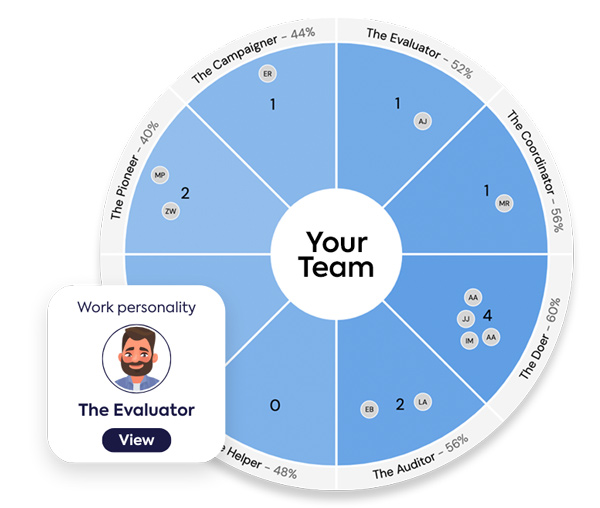25 Good Interview Questions to Ask for Effective Hiring
The article "25 Good Interview Questions to Ask for Effective Hiring" stresses the importance of strategic interview questions in identifying top...
Become the expert on delivering
valid and fair assessments for
your training and education.
Hire
|
Engage
|
Develop
|
|
Automatically match to candidates who are a great fit for your team culture and who are intrinsically motivated to succeed. |
Deeply understand your organisation with science-backed analytics on your culture, team design, and engagement. |
Back your onboarding, compliance and skill development with industry-leading credentialling, competency and capability expertise.
|
Hey Compono helps you understand your personality and how to turn it into your superpower.
First 1,000 users get 10 minutes free.
Just $15 a month after that — cancel anytime.

Optimising the hiring process can feel like a Herculean task, especially when it comes to interviews. Crafting the right interview questions is more than just jotting down a checklist; it’s about creating a strategy that places equal emphasis on skills, cultural fit, and future potential.
If your current interview process feels like it’s yielding just ‘good enough’ hires instead of exceptional ones, this guide is here to help. From behavioural inquiries to avoiding cognitive traps, we’ll walk you through best practices for asking interview questions that actually work.
By the end, you’ll have actionable tips to improve your interview process, reduce bias, and ultimately, make better hiring decisions.
Interview questions are the core of any hiring process. They’re your chance to uncover what’s not on the CV or LinkedIn profile. Done right, you’ll understand not only a candidate’s experience but also their work ethic, preferred work style, and ability to align with your team’s culture.
But there’s a catch. Not all questions are created equal. Asking vague or overly technical questions risks alienating candidates or even causing you to miss potential rockstars.
The best questions strike a balance. They explore skills and qualifications while assessing personality, adaptability, and cultural alignment. Structured, thoughtful questions are shown to reduce bias in interviews, ultimately leading to higher-quality hires.
Easily one of the most reliable types, behavioural questions are centred on past experiences. The logic is simple: how someone handled a situation in the past says a lot about how they might handle it in future.
Example
"Tell me about a time you had to manage competing deadlines. How did you prioritise, and what was the outcome?"
Why they work
Behavioural questions provide insights into problem-solving skills, interpersonal ability, and resilience. They’re especially useful when looking to gauge emotional intelligence and adaptability.
Pro Tip
Encourage candidates to use the STAR method (Situation, Task, Action, Result) in their responses. This ensures structured answers and eliminates vagueness.
Think of these as behavioural questions’ forward-looking cousin. Situational questions are hypothetical and designed to see how someone would approach potential workplace challenges.
Example
"Imagine your team hasn’t met a key project deadline. How would you address it with both the client and your team?"
Why they work
Situational questions are excellent for roles where improvisation and quick decision-making are critical. They reveal how a candidate thinks and whether their approach aligns with your company’s methods and culture.
Depending on the role, assessing technical skills is often non-negotiable. However, the key is to balance technical proficiency evaluation with fairness.
Example
"How would you debug [specific software issue] in an application currently on a live website?"
Why they work
Technical questions provide clear data points. Combined with a skills assessment platform to validate responses, hiring managers can ensure decisions are influenced by facts, not assumptions.
Beware of live tests
Studies show that live technical tests can be high-stress and lead to a 50% reduction in performance. Whenever possible, allow candidates to complete technical tasks outside of the pressure-filled interview setting.
Finding the right resume is one thing, but finding someone who lives and breathes your company’s values? Priceless. Cultural fit questions are designed to ensure your chosen candidates complement your workplace environment.
Example
"Tell me about a workplace culture where you thrived. What made it such a good fit?"
Why they work
These questions focus on long-term potential. Candidates who align with your values and work style are more likely to stick around and contribute positively to your team’s atmosphere.
Crafting interview questions should never be left to chance. It’s a strategic process that requires careful planning. Here are some tips to guide you.
Understand the role’s key responsibilities and qualifications. Create a profile of the perfect candidate—not just in terms of skills but also personality and cultural alignment.
Generic questions lead to generic insights. Tailor your questions to reflect not just the role but also your company’s unique work style and values.
Ask open-ended questions like, "Can you walk me through a time when...?" Candidates’ responses to these questions often reveal more than a straightforward yes or no could.
Brain-teasers or trick questions (e.g., “How many golf balls would fit in a Boeing 747?”) don’t offer much insight into a candidate’s potential. Stick with meaningful, practical questions instead.
Example
Rather than asking a candidate to name their greatest weakness, ask how they’ve improved on a skill over time.
Unconscious bias is a silent saboteur in the hiring process. While it’s impossible to eliminate entirely, there are practical steps to reduce its occurrence.
Create a standard list of questions for every candidate applying for the same role. This ensures consistency and a fair comparison.
Pro Tip
Compono’s assessment tools allow you to screen candidates based on skills, personality traits, and cultural alignment. Automating this upfront guarantees a broad yet focused candidate pool.
See how Compono works here.
Are you unintentionally leaning towards the most eloquent candidate? Or someone with a similar background to yours? Refocus attention on skills, qualifications, and measurable workplace compatibility.
Human bias can creep into grading unless rubrics are as objective as possible. Use a scorecard to rate candidates’ answers based on specific criteria. Assign weights to cultural fit, experience, and problem-solving skills based on the role.
Have multiple members from different departments participate in interviews. When everyone brings their unique lens, a candidate’s suitability for the role becomes more well-rounded.
It’s tempting to lean too heavily on past behaviours. But remember, interviews shouldn’t solely be a retrospective exercise.
Equally important is what a candidate could bring to your team in terms of adaptability, growth mindset, and alignment with your organisation’s long-term goals.
Using Compono’s science-backed insights, you can identify not only the most suitable candidates today but those most likely to excel in the years to come.
Want to learn more? Book a free, 15-minute demo with Compono and see how predictive hiring can transform your process.

The article "25 Good Interview Questions to Ask for Effective Hiring" stresses the importance of strategic interview questions in identifying top...

Ever looked at those dream teams that just seem to click, where everyone’s strengths complement each other perfectly, and wondered how they got it...

Hiring the right person isn’t just about filling a vacancy; it’s about building a team that clicks. Whether you’re a recruiter refining your hiring...